What's Wylfa - and why is it so important?
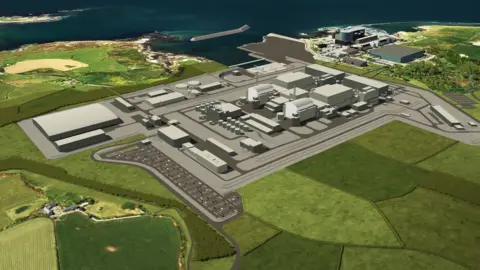 Horizon Nuclear
Horizon NuclearThere has been concern about whether or not there will be a new Wylfa nuclear plant in Wales in recent weeks.
The future of plans for Wylfa is unclear after Japanese tech company Hitachi said it was suspending work on the nuclear power plant.
So what is the big fuss about it - and what does Hitachi's announcement mean for people in Wales?
Here is what you need to know about Wylfa Newydd.
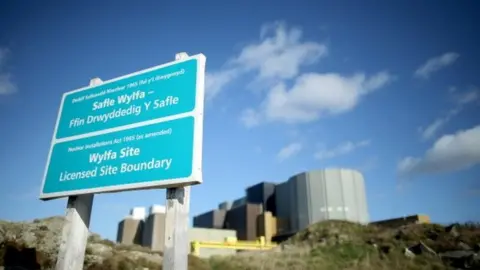 Getty Images
Getty ImagesWhy is Wylfa a big deal?
Wylfa Newydd is a plan for a nuclear plant in north Wales. As nuclear plants go in the UK, it is a big one.
It represents a real economic opportunity for north Wales to grow and would create about 9,000 jobs for people during construction.
There are plans to build two to three power plants at Wylfa in Anglesey and another in Gloucestershire, producing nuclear energy in the 2020s.
It is a huge chance for young people to get highly skilled, well paid work and for businesses in north Wales to grow.
And it could have ripple effects throughout the whole of Wales, by bringing £5.7bn to the Welsh economy, according to independent research.
Welsh Secretary Alun Cairns said the scheme would be the "biggest infrastructure project in Wales for a generation".
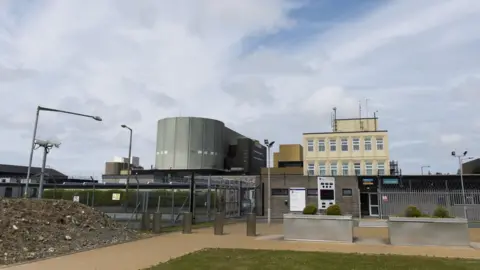 Getty Images
Getty ImagesWho is Hitachi and why is it thinking of pulling out?
Big nuclear plans like Wylfa do not come cheap. It is a multi-billion pound investment being carried out by giant Japanese tech company Hitachi.
But there are worries Hitachi may ditch the project - especially since announcing it will suspend it - because construction costs could rise, and uncertainty about what Brexit will mean.
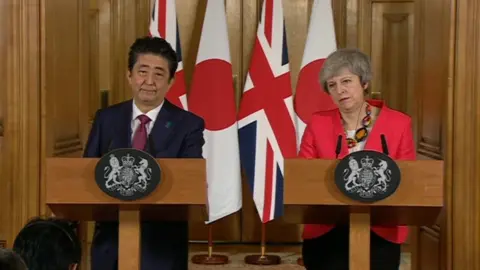
The company has been in talks with the UK government since June last year to agree how Wylfa Newydd will be paid for.
These negotiations are critical to the project because it decides how much public money can be invested into Wylfa.
Wylfa is an expensive commitment - even for a big company like Hitachi. So it is counting even more on taxpayer money helping them out.
However with the UK government's efforts fixed on Brexit, the firm has now "pressed the pause button", as an economic adviser put it.
There is no upfront cash, no solid commitment by the government, so Wylfa Newydd is becoming riskier for Hitachi.
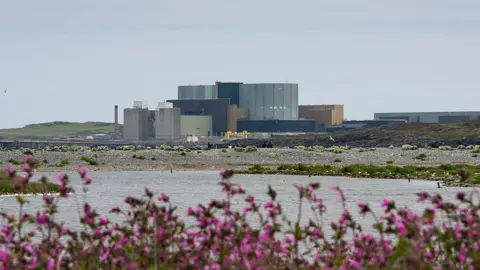 Getty Images
Getty ImagesWhat happens if Wylfa is later scrapped?
If Hitachi completely pulls the plug it is bad news for people and businesses in Wales.
It has just started hiring young apprentices and there is a £90,000 promise for an apprentice training scheme in Anglesey.
So without the promise of Wylfa, could it mean a brain drain for north Wales?
This includes people outside Anglesey too.
People across north Wales, from Wrexham to Porthmadog hoping to benefit would have to look elsewhere for anything close to this size of engineering opportunity.
So who is affected if there is no Wylfa?
The impacts of this would-be investment boost to Wales will be felt by people and Welsh businesses far and wide.
Seventeen-year-olds looking for work at Wylfa would have to look to England for well-paid skilled jobs in the nuclear industry.
And businesses in Wales who have already felt the benefit from the nuclear plans, may get less employment.
As Coleg Menai welding student Osian Jones said: "The more jobs that come in, the more opportunities."